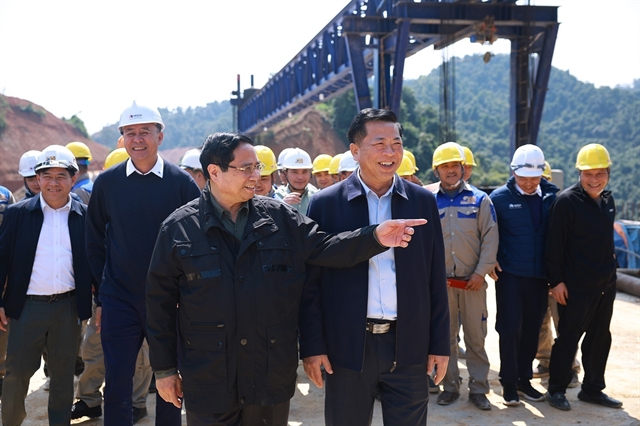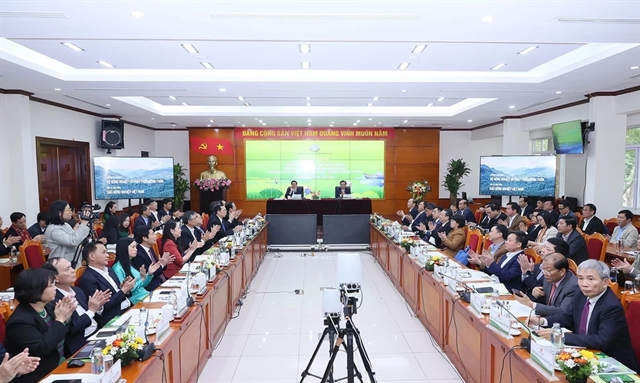 Society
Society
.jpg)

|
| Delegates at the conference to review the activities of 2023 and outline the plans for 2024 organised by the Ministry of Agriculture and Rural Development on Wednesday. VNA/VNS Photo Dương Giang |
HÀ NỘI – Prime Minister Phạm Minh Chính has urged the agricultural sector to keep its crucial role as the backbone of the economy, ensuring robust food security, contributing significantly to overall economic stability in 2024.
At the online conference to review the activities of 2023 and outline plans for 2024 organised by the Ministry of Agriculture and Rural Development on Wednesday, PM Chính affirmed that the agriculture sector has become more proactive and innovative with many initiatives to transform the challenging situation and make breakthroughs.
Reports at the conference evaluated that 2023 was a year of innovative thinking and growth model transformation in agriculture. The sector shifted strongly from a production-oriented mindset to an agricultural economic development perspective, moving from single-sector development to cooperation and diversification, promoting the integration of multiple values in agro-forestry-fishery products, and transitioning from agricultural product supply chains to developing industry-specific chains.
The agricultural sector witnessed a GDP growth of 3.83 per cent, the highest in recent years, contributing significantly to the overall economic growth of 5.05 per cent.
Rice production reached 43.5 million tonnes, an increase of 1.9 per cent compared to the previous year; pork production amounted to 7.79 million tonnes, an increase of 6.38 per cent; and aquatic product output reached 9.32 million tonnes, an increase of 2.3 per cent.
The total export turnover of agriculture, forestry and fishery maintained a high level, exceeding US$53 billion, with the highest trade surplus ever at $12.07 billion, an increase of 43.7 per cent compared to the previous year. Some items achieved record high growth, such as vegetables and fruits at $5.69 billion and rice at $4.78 billion, increases of 69.2 and 38.4 per cent, respectively.
Việt Nam succeeded in producing and exporting commercial vaccines to prevent African swine fever.
The "One Commune, One Product" (OCOP) programme has created diverse and rich products. The number of OCOP products rated three stars or above has now reached over 11,000 products, an increase of more than 2,000 compared to 2022.
For the first time, Việt Nam successfully sold 10.3 million carbon credits to the Carbon Partnership Fund, earning $1.2 trillion. This serves as a basis for continuing research and improving mechanisms and policies in the future.
In 2024, the agricultural sector has set the targets with indicators, including a GDP growth rate of 3-3.5 per cent, and total export turnover of agriculture, forestry and fishery at around $54-55 billion.
It has also targeted to reach 80 per cent of communes meeting new rural standards, the stable maintenance of forest coverage at 42.02 per cent, 58 per cent of rural households using clean water, and 82 per cent of communes meeting environmental and food safety criteria.
Speaking at the conference, PM Chính highly appreciated the results and achievements the agriculture sector has attained.
The ministry has focused on efficiently implementing numerous significant programmes, mechanisms and policies for the development of the sector, such as the strategic development plan for rural agriculture, the sustainable development project for one million hectares of high-quality rice cultivation with low emissions linked to green growth in the Mekong Delta region by 2030, and support policies to enhance livestock efficiency and farm economic development. Many events such as the International Rice and Rice Products Festival, and Cà Mau Shrimp Festival have been organised successfully, he said.
He noted that the ministry worked with relevant ministries and sectors to address difficulties in production and business activities. The VNĐ15 trillion credit package for the timber and fisheries industry has been disbursed quickly and effectively.
The Prime Minister also highlighted some limitations and challenges in the sector, such as not yet resolving IUU yellow card issues and some prolonged issues like the Bản Mồng water reservoir project.
PM Chính requested the agriculture sector to set higher overall growth targets of around 3.5-4 per cent in 2024, with agricultural, forestry and fishery exports reaching over $55 billion.
The Prime Minister emphasised the need to focus on innovation, promote digital and green transformation and circular economy. In the short term, attention should be given to building a database for the agriculture sector and developing the carbon credit market.
Efforts should continue to improve institutional frameworks, develop policies, strategies and planning, especially the remaining three national sector plans, including forestry development plan, protection of fisheries resources plan, and plan for the fishing port system, sheltering areas for fishing boats.
Efficient implementation of the "One Commune, One Product" (OCOP) programme and the "Sustainable Development of One Million Hectares of High-Quality Rice Cultivation with Low Emissions Linked to Green Growth in the Mekong Delta Region by 2030" project.
PM Chính also urged the application of high-tech, smart and automated technologies in agricultural production. The sector should improve supply and demand forecasting, market information, connect producers with consumers, and take advantage of benefits from free trade agreements to restructure the export market.
He stressed the development of the maritime economy, sustainable marine aquaculture and fisheries exploitation, and the addressing of the European Commission's recommendations to lift the yellow card in 2024.
PM Chính asked the sector to enhance the management, protection and development of forests, especially natural and protective forests, and complete the 2024 plan to implement the plantation of one billion trees in the 2021-2025 period.
He called on the sector to strengthen international integration and cooperation to develop agriculture and rural areas, while proactively fighting to protect the rights and interests of the country, safeguard Vietnamese agricultural products, and protect the legitimate rights and interests of citizens and businesses. – VNS
.jpg)



